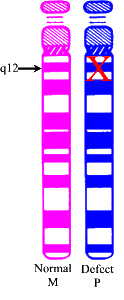
So a little background on Prader Willi Syndrome. It's a rare genetic disorder where seven genes on chromosome 15 are deleted or unexpressed on the paternal chromosome. More than one gene is involved in PWS, and these genes are near each other in a small area of the “long arm” of chromosome 15. Even today, scientists still are unsure of the exact number and type of genes involved. There are three different chromosome errors that keep these genes that results in Prader-Willi syndrome. The two most common errors that cause PWS can occur in any baby, meaning that, for the most part, PWS is not an inherited condition; it just happens. PWS is an example of genetic or genomic imprinting, which means that some of our genes have to come from a specific parent in order to function normally. These genes are “imprinted,” meaning that they have the ability to be turned off or on, depending on which parent gave the gene. In the “Prader-Willi region” of chromosome 15 (the area of the deletion), there are genes that must come from the father that are active in order to work. These genes are not active or expressed on the chromosome 15 inherited from the mother because the mother’s imprint turns them off. In Prader-Willi syndrome, these critical genes are either missing (deleted) from the father’s chromosome 15, functioning improperly because of an imprinting defect, or the entire chromosome 15 from the father is missing and both chromosome 15s come from the mother. In my case, both chromosomes came from me, the mother (thanks for slacking, Holy Spirit) which lead to the baby having Prader Willi Syndrome.
 RSS Feed
RSS Feed